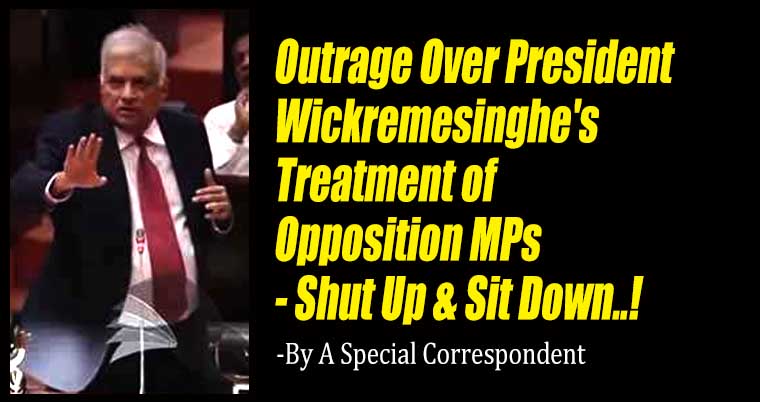-By A Special Correspondent

(Lanka-e-News -12.Feb.2024, 11.00 PM) In a shocking display of disrespect and aggression, Sri Lankan President Ranil Wickremesinghe has come under fire for shouting "shut up" and "sit down" at opposition Members of Parliament (MPs). This incident has sparked outrage among the public, signaling a troubling deterioration in the decorum of Sri Lankan politics.
President Wickremesinghe's outburst occurred during a parliamentary session, where opposition MPs were raising concerns about various issues affecting the country. Instead of engaging in constructive dialogue, the President resorted to rude and dismissive behavior, undermining the democratic process and stifling dissent.
The incident involving President Wickremesinghe represents a departure from the norms of political civility that have characterized Sri Lankan politics in the past. Historically, politicians have engaged in respectful discourse, even amidst ideological differences. However, President Wickremesinghe's behavior sets a dangerous precedent, normalizing hostility and aggression in political interactions.
President Wickremesinghe's authoritarian response to opposition voices reflects his failure as a leader to uphold democratic values and principles. His appointment to parliament without a public mandate and his disregard for the concerns of ordinary citizens demonstrate a lack of empathy towards those who are struggling under his administration. Moreover, his failure to hold local elections further erodes public trust in his leadership.
The President's abrasive behavior comes at a time of economic turmoil in Sri Lanka, exacerbated by his implementation of IMF austerity measures. The recent approval of a $2.9 billion bailout loan from the IMF reflects the government's desperation to address fiscal challenges. However, these measures have led to widespread protests and social unrest, as ordinary Sri Lankans bear the brunt of economic hardships.
Despite President Wickremesinghe's attempts to silence opposition voices, the Sri Lankan public refuses to be silenced. Rising taxes, increased cost of living, and high unemployment rates have galvanized citizens to demand accountability from their leaders. The government's decision to sell off state-owned enterprises to foreign companies further exacerbates public discontent and exacerbates economic inequality.
The incident involving President Wickremesinghe's verbal attacks on opposition MPs underscores the urgent need for a return to civility and respect in Sri Lankan politics. It also highlights the broader issues of failed leadership, economic hardship, and public resistance facing the country. As Sri Lankans continue to voice their concerns and demand accountability, it is imperative for leaders to listen to their grievances and work towards inclusive and responsive governance. Failure to do so risks further destabilizing the country and undermining its democratic institutions.
---------------------------
by (2024-02-12 18:59:03)
Leave a Reply